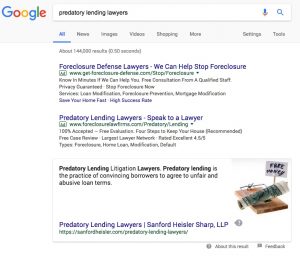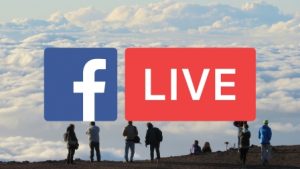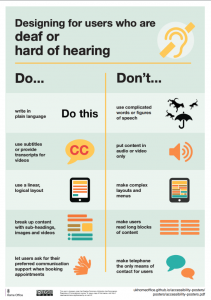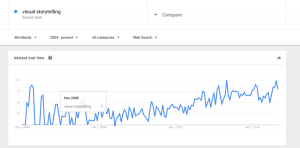Pay-per-click (PPC) advertising is hands down one of the best ways to reach potential customers, build brand awareness and get them to buy your products or services. Over the years, platforms like Google Ads and Facebook Ads just keep improving their targeting, algorithms and everything else you need to succeed at PPC.
That being said, even mastering one PPC platform can be a challenge, and with the wide variety of options and opportunities available to you, it’s often hard to figure out where to focus your time, energy and budget.
This is especially true when you don’t have a dedicated marketing team to manage everything for you. Running a business is hard enough on it’s own without trying to juggle the demands of multiple PPC campaigns on multiple platforms.
So, if you can only pick one PPC advertising channel to focus on, which one should it be? Paid search? Or paid social?
While these aren’t your only options, they’re the two biggest ones in front of most businesses and understanding the differences between the two will help you identify the right marketing channel for your business. Once you know which channel you should be using, all you have to do is figure out which specific platform will be best for getting in front of your target audience.
With all of that in mind, let’s take a look at paid search, paid social and what makes them better suited to different business goals and needs.
Paid Search vs Paid Social
Before we can really talk about whether paid search or paid social is a better PPC channel for your business, we need to take a step back and talk about how each of these channels work. Both of these marketing channels target people in fundamentally different ways and understanding those difference is the key to figuring out which channel is right for you.
Paid Search
Paid search is a responsive type of advertising. A user types in a search query, the platform decides that your ad is relevant to that query and your ad shows up. Google Ads, Bing Ads, Yahoo and even Pinterest’s search ads all use this approach to deliver targeted, highly relevant ad content to users who are actively searching for that sort of content.
As a quick example, let’s imagine that you run a flower shop and you want to attract more wedding bouquet customers. If your campaigns are set up correctly, your ads should show up when someone searches on Google for “flowers for wedding”. Since your ad should be a good match for their needs, there’s a good chance that they’ll click your ad and hopefully make a purchase.

The key to paid search is the fact that it’s intent-based marketing. It’s great when you’re trying to market a product or service that people are actively searching for online. By the time they type in that search query, they’re already fairly low in the sales funnel, so all you have to do is convince them to buy from you…instead of the competition.
Paid Social
Paid social, on the other hand, is an intrusive type of advertising. Someone is checking out their social media feed, the platform determines that they meet your targeting criteria and shows your ad. Maybe they’re in the market for what you’re selling, maybe they’re not, but either way, they see your ad.
When it comes to paid social, most people immediately think of Facebook Ads, but there are a lot of paid social platforms out there (Instagram Ads, YouTube Ads, Twitter Ads, Reddit Ads, etc), and they all work in the same basic way.
Now, the fact that paid social advertising is intrusive doesn’t mean that it doesn’t work. Marketers have successfully used intrusive advertising for decades with things like billboards, radio ads or television commercials. Paid social is a lot like these tried-and-true marketing channels—with two caveats: targeting and tracking.
With a television commercial, you have only the loosest guesses as to who is seeing your ads or whether they are working. With paid social, however, you can get incredibly specific with who you target and then track how different audiences respond to your ads.
As a marketing channel, paid social ads are great for getting in front of audiences that might not otherwise find you online. Not everyone searches on Google for the solution to their problem—heck, your potential customers may not even be aware that they want or need your product!
For example, a friend of mine recently bought eucalyptus for her house because of an ad like this:
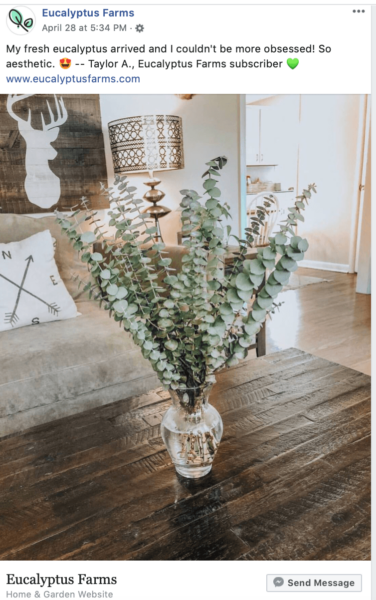
Prior to seeing these ads, she didn’t even know that she could buy fresh eucalyptus. It wasn’t on her radar until she saw the Facebook ad. But, once she discovered that this was something she could buy, she realized that it was something that she wanted to buy.
Whether you’re trying to build awareness for a product, a service or just your business in general, paid social is a great way to get onto your target audience’s radar—especially when you’re trying to sell something that most people might not actively seek out otherwise.
Which Channel is Right for You?
So, which is better for your business? Paid search? Or paid social? To be honest, they can both provide a lot of value to most businesses, but if funds and/or time are tight and you have to pick one, which channel should you prioritize?
The answer to that question is highly business-dependent. For certain goals and priorities, paid search is ideal. For others, paid social is the obvious choice. To help you figure out which channel is best for your business, let’s take a look at how paid social and paid search shake out in the following key areas: speed of results, cost and brand building.
Best for Speedy Results: Search
If you need sales now and sell something that meets a need are aware of and actively seek solutions for, paid search should be your go-to marketing channel.
Because paid search targets the bottom-of-the-funnel, most people who click on your paid search ads are well on their way to making a purchase. If they don’t buy from you, there’s a good chance that they’ll buy from the competition.
So, when you invest into paid search, the results are usually fairly quick. For example, when someone searches for an emergency plumber, it’s not a decision they’re going to sit and stew over. They need help now!
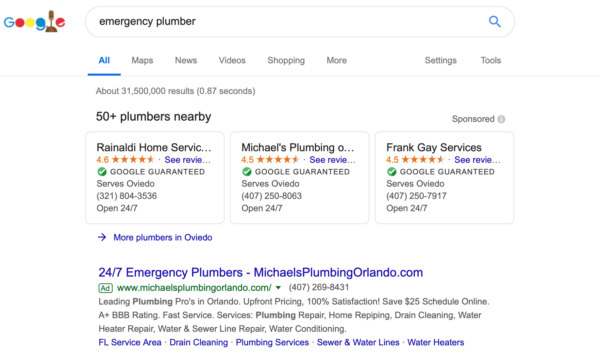
To make things even better, you can make your paid search ads very direct. Your audience is looking to buy, and they want you to help them choose the right solution to their problem by making as compelling of a case for your business as possible.
With paid social, however, things are a bit more tricky. You’re interrupting your audience and hoping that they’ll be interested enough to buy, but to be honest, most of the people who see your ads will need some time to warm up to your product, service or company before they make a purchase. My friend who bought the eucalyptus saw those ads quite a few times before she finally decided to buy.
Of course, if you’re selling an impulse buy or have a particularly affordable offer, paid social can produce speedy results, but that’s generally the exception, not the rule.
Best for Cost: Varies…
“Which is cheaper, Facebook Ads or Google Ads?” is a question I get quite a lot. And it makes sense. You want to get the best bang for your buck, so it’s natural to want to know which ad platform will produce the cheapest results.
The only problem is, there’s no easy answer to this question.
If all you care about is your cost-per-click, paid social is definitely “cheaper” than paid search. After all, paid search clicks are more targeted, lower in the funnel and more likely to “buy now”, so it makes sense that they would be more competitive and cost more.
However, even with paid search, cost-per-click has a huge range of variability. On Google Ads, you might pay $ 3.00 per click for a keyword like “ice cream shop”. For a keyword like “personal injury attorney”, however, you could be paying $ 80 per click.
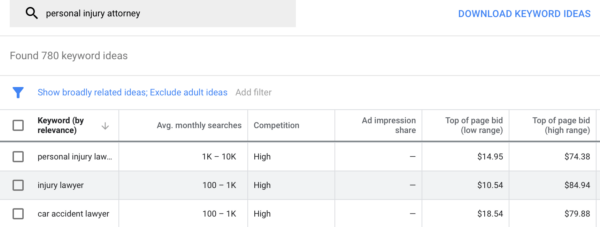
In contrast, the average CPC for Facebook Ads is about $ 1.00. For a particularly competitive audience, you might pay as much as $ 3.00 a click. On the surface, that seems like a much cheaper way to go, but looks can be deceiving.
Remember, you don’t make money off of clicks. You make it off of sales.
Sure, you might only pay $ 1 a click on Facebook Ads, but if only 1-in-300 clicks produces a paying customer, you’re paying $ 300 per sale. A click on Google Ads might cost you $ 30, but because those clicks are higher-intent, it might only take 10 clicks to make a sale, so you’re still paying $ 300 per sale.
This is why it’s so hard to predict whether paid social or paid search will generate a better return-on-ad-spend. Both can be extremely profitable or prohibitively expense—or anything in between—so the differences in CPC shouldn’t be your primary criterion for choosing one channel over the other.
Best for Building Your Brand: Social
Getting quick results is great. Making a great return-on-investment is vital. But if you really want to grow your business, you need to do more than just optimize for the fastest, most profitable results.
If you want your business to grow, you need to build your brand.
When it comes to building a brand, paid search really isn’t all that useful. Most people don’t type in a search query online because they’re looking for a brand to fall in love with. Their goal is to solve a problem, not to build a relationship.
Paid social, on the other hand, really shines in this area. I mean, the whole point of social media is to build relationships. When people hop onto Facebook or Instagram, they’re not thinking about buying a new blender, they’re looking for connection: connection with people, connection with influencers…and even connection with brands.
So, if you want to build awareness and get people to buy into your company’s vision and brand story, there’s no better place to do it than social media.

Need to generate a buzz about your new product? Paid social is the way to go. Want to be the first company a potential client thinks of when they need help? Get in front of them with paid social. Looking for ways to work people through your marketing funnel? Paid social just might be your best bet.
With paid social, you can get people ready to buy, and more specifically…ready to buy from you. If people know your business and believe in what you do and sell, they won’t need to hop on Google and search around for a solution—they’ve already got you.
Best for You?
So, is paid search or paid social better for your business? Hopefully, at this point, you should have a good sense for the differences between the two channels and where their strengths and weaknesses lie.
To be honest, the right primary PPC channel for your business will depend on what you’re selling, how your business works, who you’re targeting and what you’re trying to accomplish. As a general rule, though, paid search is better for quick sales and paid social is better for long-term branding—although you can do both with either channel.
The best play, of course, is to integrate the two. For example, if you need sales now, you can set up a solid paid search strategy to get people onto your website. Then, for the people who don’t buy right away, you can use social media advertising to retarget them and bring them back. Simultaneously, you can start to build out brand awareness campaigns on social media that fill your marketing funnel for the future, ensuring that your business will grow and thrive over time.
In the end, the best PPC approach is the one that delivers the results your business needs…now, tomorrow, and for years to come.
Digital & Social Articles on Business 2 Community
(69)
Report Post
